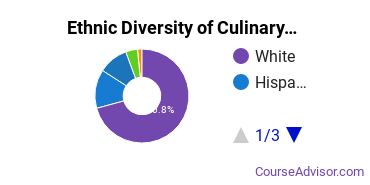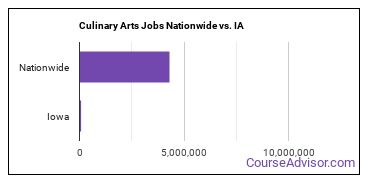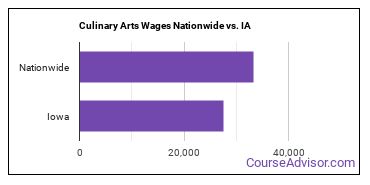Culinary Arts Schools in Iowa
200 Culinary Arts students earned their degrees in the state in 2020-2021.
In this state, Culinary Arts is the 101st most popular major out of a total 268 majors commonly available.
Featured schools near , edit
Education Levels of Culinary Arts Majors in Iowa
Culinary Arts majors in the state tend to have the following degree levels:
| Education Level | Number of Grads |
|---|---|
| Associate Degree | 85 |
| Award Taking 1 to 2 Years | 74 |
| Award Taking 2 to 4 Years | 74 |
| Award Taking Less Than 1 Year | 41 |
| Award Taking 12 Weeks to 1 Year | 41 |
| Award Taking Less 12 Weeks | 41 |
Gender Distribution
In Iowa, a culinary arts major is more popular with women than with men.

Racial Distribution
The racial distribution of culinary arts majors in Iowa is as follows:
- Asian: 2.5%
- Black or African American: 4.0%
- Hispanic or Latino: 13.0%
- White: 69.0%
- Non-Resident Alien: 1.5%
- Other Races: 10.0%

Jobs for Culinary Arts Grads in Iowa
51,920 people in the state and 4,290,110 in the nation are employed in jobs related to culinary arts.

Wages for Culinary Arts Jobs in Iowa
In this state, culinary arts grads earn an average of $27,590. Nationwide, they make an average of $33,210.

Most Popular Culinary Arts Programs in IA
There are 7 colleges in Iowa that offer culinary arts degrees. Learn about the most popular 7 below:
Seeking financial aid? At this school, 71% of students receive it. In their early career, DMACC grads earn an average salary of $31,906. 20 to 1 is the student to faculty ratio.
This public college charges it's students an average net price of $9,906. Of all the students who attend this school, 82% get financial aid. The full-time teacher rate is 99%.
This school boasts a lower than average student loan default rate of 7.60%. The full-time teacher rate is 32%. A typical student attending Western Iowa Tech Community College will pay a net price of $8,309.
The student loan default rate of 9.10% is a good sign that graduates can afford their loan payments. Students who attend this public school pay an average net price of $10,227. Of all the teachers who work at the school, 100% are considered full time.
93% of students get financical aid. In their early career, IHCC grads earn an average salary of $31,962. Students enjoy a student to faculty ratio of 14 to 1.
Roughly six years after entering college, graduates of this school earn $32,467 a year. 94% of students are awarded financial aid at this school. Students enjoy a student to faculty ratio of 17 to 1.
Of all the teachers who work at the school, 100% are considered full time. This public school has an average net price of $11,682. Of all the students who attend this school, 86% get financial aid.
Culinary Arts Careers in IA
Some of the careers culinary arts majors go into include:
| Job Title | IA Job Growth | IA Median Salary |
|---|---|---|
| Cooks | 14% | $26,620 |
| Chefs and Head Cooks | 13% | $38,580 |
| Bakers | 12% | $25,520 |
| Restaurant Cooks | 12% | $24,080 |
| Food Service Managers | 10% | $44,350 |
| Food Preparation and Serving Worker Supervisors | 9% | $29,940 |
| Professors | 9% | $54,370 |
| Butchers and Meat Cutters | 8% | $24,570 |
| Slaughterers and Meat Packers | 6% | $32,330 |
| Food Scientists and Technologists | 6% | $60,630 |
| Institution and Cafeteria Cooks | 6% | $26,830 |
| Bartenders | 4% | $19,070 |
Related Majors in Iowa
Below are some popular majors in the state that are similar to culinary arts.
| Major | Annual Graduates in IA |
|---|---|
| Funeral & Mortuary Science | 27 |
| Cosmetology | 6 |
View all majors related to Culinary Arts
Explore Major by State
Alabama
Arkansas
Connecticut
Florida
Idaho
Iowa
Louisiana
Massachusetts
Mississippi
Nebraska
New Jersey
North Carolina
Oklahoma
Rhode Island
Tennessee
Vermont
West Virginia
View Nationwide Culinary Arts Report
References
- College Factual
- National Center for Education Statistics
- O*NET Online
- Image Credit: By U.S. Army Europe Images under License
More about our data sources and methodologies.
Featured Schools
 Request Info
Request Info
|
Southern New Hampshire University You have goals. Southern New Hampshire University can help you get there. Whether you need a bachelor's degree to get into a career or want a master's degree to move up in your current career, SNHU has an online program for you. Find your degree from over 200 online programs. Learn More > |


